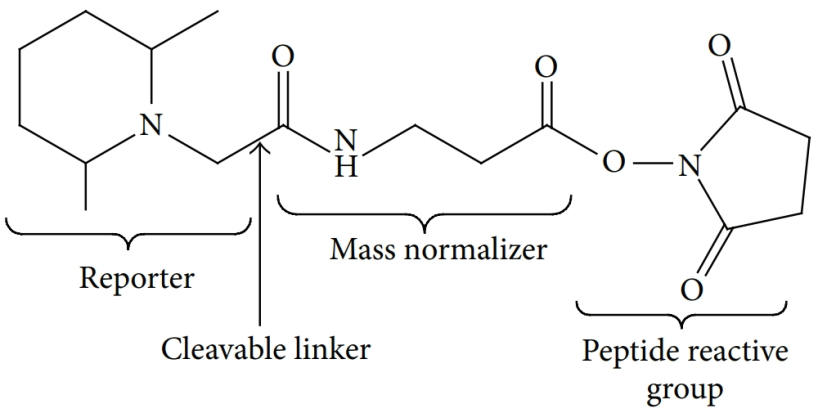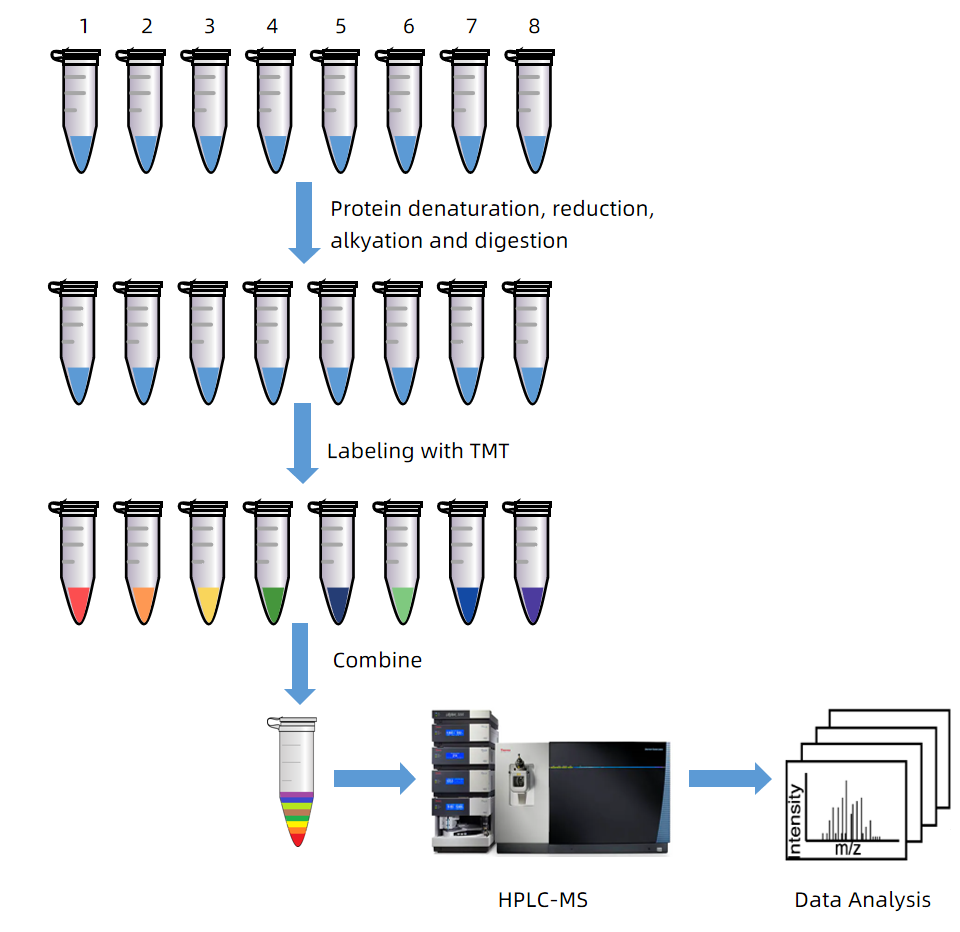Tandem Mass Tag (TMT) Technology Service
Tandem Mass Tag (TMT) is a highly efficient, multi-sample quantitative analysis method widely used in proteomics, particularly for its ability to precisely analyze protein expression differences in complex biological samples. By using stable isotope labeling, Tandem Mass Tag (TMT) enables the simultaneous quantification of proteins across multiple samples, supporting the parallel analysis of up to 18 samples. This capability significantly enhances both experimental throughput and the accuracy of data.
Tandem Mass Tag (TMT) reagents consist of three key components: a reporter group, a balance group, and a peptide-reactive group. The reporter group generates specific ion signals in MS2, enabling relative quantification of different samples. The balance group ensures consistent molecular weight characteristics in MS1 by compensating for mass differences among labeled peptides. The peptide-reactive group efficiently labels peptide N-termini or lysine side chains via chemical reactions. With its innovative design, it significantly enhances both experimental throughput and data accuracy.

Figure 1. Chemical Structure of TMT Tags
Supported by high-end instruments such as the Thermo Fisher Orbitrap Fusion Lumos and a team of seasoned experts, MtoZ Biolabs provides precise, high-sensitivity Tandem Mass Tag (TMT) Technology Service to help researchers achieve breakthroughs in complex scientific challenges.
Analysis Workflow
MtoZ Biolabs delivers Tandem Mass Tag (TMT) Technology Service through a systematic and standardized workflow, ensuring precision and reproducibility at every stage:
1. Sample Preparation: Proteins are extracted from cells, tissues, or biological fluids, with each sample containing at least 50 μg of protein, verified by rigorous quantification protocols.
2. Enzymatic Digestion: Optimized trypsin digestion converts proteins into peptides under strictly controlled conditions to maintain peptide integrity and consistency.
3. TMT Labeling: Appropriate TMT tags are selected based on experimental design. Labeling efficiency and specificity are ensured through a robust labeling protocol and stringent quality control.
4. Sample Mixing: Labeled peptides are proportionally mixed to minimize variability and ensure uniformity, facilitating accurate downstream analysis.
5. Liquid Chromatography Fractionation: Peptides are fractionated using optimized HPLC methods, achieving high resolution for enhanced mass spectrometry analysis.
6. Mass Spectrometry Analysis: Advanced LC-MS/MS systems, such as the Thermo Fisher Orbitrap Fusion Lumos, perform high-sensitivity peptide identification and quantification, generating reliable data.
7. Data Analysis: Expert analysis using tools like Proteome Discoverer produces comprehensive quantitative reports, ensuring accurate interpretation of experimental results.

Figure 2. Workflow for Relative Quantification Using 8 plex TMT
Why Choose MtoZ Biolabs?
1. Technical Advantages
· High Throughput
Analyze up to 18 samples simultaneously in one experiment, significantly improving efficiency and speeding up analysis.
· High Sensitivity
Detect even low-abundance proteins with high sensitivity, ensuring comprehensive data coverage.
· Minimized Variation
Process all samples in the same mass spectrometry run to ensure consistent and comparable data.
· Precise Quantification
TMT tags enable accurate relative quantification through unique reporter ions in MS2 analysis.
· Wide Applicability
Suitable for diverse sample types, including cells, tissues, and biofluids, supporting various research needs.
2. Service Advantages
· Advanced Analysis Platform
MtoZ Biolabs established an advanced Tandem Mass Tag (TMT) analysis platform, guaranteeing reliable, fast, and highly accurate analysis service.
· Flexible Tag Options
Choose from 6-plex, 10-plex, 16-plex, and 18-plex tags, tailored to meet different research scales.
· High-Data-Quality
Deep data coverage with strict data quality control. AI-powered bioinformatics platform integrates all proteomics analysis data providing clients with a comprehensive data report.
· One-Time-Charge
Our pricing is transparent, no hidden fees or additional costs.
· Customized Service
Personalized workflows designed to fit project requirements and deliver reliable results.
Applications
MtoZ Biolabs’ Tandem Mass Tag (TMT) Technology Service supports a wide range of research applications, including biomarker discovery, drug target identification, pathway analysis, post-translational modification (PTM) studies, and stress response analysis. Our service delivers reliable insights to drive advancements in disease diagnosis, drug development, and basic scientific research.
Partner with MtoZ Biolabs for high-performance TMT-based proteomics solutions and elevate your research to new heights.
FAQ
Q1: What are the differences between Tandem Mass Tag (TMT) and iTRAQ?
Both Tandem Mass Tag (TMT) and iTRAQ are chemical labeling technologies for quantitative proteomics. Tandem Mass Tag (TMT) offers higher sample multiplexing (2-plex to 18-plex), making it suitable for complex experimental designs, while iTRAQ supports up to 8-plex, ideal for smaller-scale studies. TMT labels generate reporter ions in the MS2 stage, making them better suited for complex samples and low-abundance proteins. In contrast, iTRAQ requires higher mass spectrometry energy, which works well for high-abundance protein quantification. MtoZ Biolabs helps clients choose the optimal labeling method based on experimental needs and provides high-quality analysis services.
2. How can I select the most appropriate TMT tag type (e.g., 2-plex, 6-plex, 10-plex, 16-plex, 18-plex) for my study?
Choosing the right TMT tag depends on the experimental design, sample number, and budget. For simple control experiments, 2-plex is ideal. 6-plex and 10-plex tags suit medium-scale studies like time-course or multi-treatment comparisons. For large-scale, high-throughput experiments, such as clinical sample analyses or biomarker discovery, 16-plex and 18-plex are recommended. MtoZ Biolabs’ team provides expert guidance to help clients select the most suitable TMT tag type, ensuring seamless integration with their research objectives.
Deliverables
1. Comprehensive Experimental Details
2. Materials, Instruments, and Methods
3. Total Ion Chromatogram & Quality Control Assessment
4. Data Analysis, Preprocessing, and Estimation
5. Bioinformatics Analysis
6. Raw Data Files
How to order?







